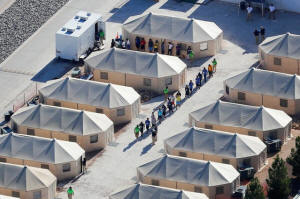|
Trump administration seeks to end
agreement on child migrant detention
 Send a link to a friend
Send a link to a friend
 [September 07, 2018]
By Yeganeh Torbati [September 07, 2018]
By Yeganeh Torbati
WASHINGTON (Reuters) - The Trump
administration said on Thursday it plans to withdraw from a federal
court agreement that strictly limits the conditions under which
authorities can detain migrant children, and proposed new rules it said
would enable it to detain minors during their immigration proceedings.
The administration has long targeted the Flores Settlement Agreement, a
1997 federal consent decree that places significant curbs on how long
and in what conditions the government can detain migrant children as it
seeks to dissuade migrants from crossing the U.S. southern border.
The regulation released on Thursday, if it goes into effect, would
enshrine some of the protections while circumventing others, by allowing
the government to detain children in facilities not licensed by state
authorities to hold minors.
Immigrants and their advocates are expected to mount legal challenges to
the move. The agreement has been interpreted over the years to set a
20-day limit on detaining children who entered the country illegally,
and also requires facilities that house migrant children to be licensed
by a state authority.

Trump administration officials have repeatedly referred to the
agreement's standards as "loopholes" that attract migrants by forcing
authorities to release people pending their immigration hearings.
Secretary of Homeland Security Kirstjen Nielsen repeated that reasoning,
saying in a statement that "legal loopholes" prevent the government from
detaining and deporting migrant families.
"This rule addresses one of the primary pull factors for illegal
immigration and allows the federal government to enforce immigration
laws as passed by Congress," Nielsen said.
Thursday's regulatory filing said the government would seek to terminate
the Flores settlement, and put forward regulations it said "parallel the
relevant and substantive terms" of the agreement.
The new rules would ensure "that all juveniles in the government's
custody are treated with dignity, respect, and special concern for their
particular vulnerability as minors," the regulation said.
[to top of second column]
|

Immigrant children now housed in a tent encampment under the new
"zero tolerance" policy by the Trump administration are shown
walking in single file at the facility near the Mexican border in
Tornillo, Texas, U.S., June 19, 2018. REUTERS/Mike Blake/File Photo

One significant change would be a new licensing system to allow
authorities to hold children in detention centers that are not
licensed by state authorities to hold children.
The facilities would be licensed by an outside auditor employed by
the Department of Homeland Security that would ensure the sites
comply with standards established by Immigration and Customs
Enforcement (ICE), the regulation says.
The American Civil Liberties Union criticized the administration's
decision to withdraw from the agreement.
"It is sickening to see the United States government looking for
ways to jail more children for longer," said Omar Jadwat, director
of the ACLU's Immigrants' Rights Project.
The administration earlier this year asked a federal court to ease
the limits mandated by the Flores agreement, but the judge
overseeing the agreement, U.S. District Court Judge Dolly M. Gee,
rejected those requests.
That attempt by the administration came after it instituted a
"zero-tolerance" policy at the U.S. border with Mexico that led to
the separation of thousands of migrant children from their parents.
After intense public outcry, the administration was forced to
abandon that policy, but hundreds of children remain separated from
parents who were deported without them.
The public has 60 days to comment on the proposal, followed by a
45-day period before the court settlement is terminated.
(Additional reporting by Tom Hals; Editing by David Gregorio and
James Dalgleish)
[© 2018 Thomson Reuters. All rights
reserved.]
Copyright 2018 Reuters. All rights reserved. This material may not be published,
broadcast, rewritten or redistributed.
Thompson Reuters is solely responsible for this content. |